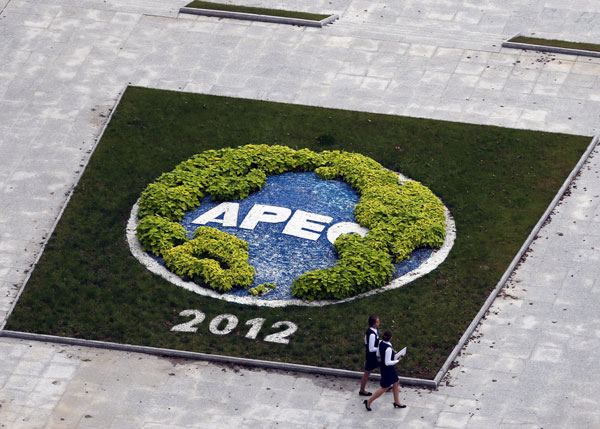
President Hu Jintao arrived in Russia's Far Eastern city of Vladivostok on Thursday for the annual economic leaders' meeting of the 21-member Asia-Pacific Economic Cooperation slated for Saturday and Sunday.
At the meeting, Hu and other leaders of APEC members will discuss trade and investment liberalization, regional economic integration, food security and establishment of reliable supply chains, as well as cooperation in fostering innovative growth.
Hu is scheduled to deliver a key-note speech at the APEC CEO summit.
 |
|
Two volunteers walk outside of the media center for the Asia-Pacific Economic Cooperation forum in Vladivostok on Wednesday. Leaders from Asia-Pacific economies gather in Russia's far east this weekend for talks aimed at promoting trade within the region. Laurent Fievet / Agence France-Presse |
In his speech, the president is expected to talk about China's current economic situation and economic policies, and make proposals on developing infrastructure for sustainable growth in the region.
"APEC members have made great progress in establishing free trade agreements within the region and they are boosting efforts to deepen trade and investment liberalization, promoting the recovery of the global economy," said Wang Yusheng, a former APEC senior official.
"The focus of APEC economies should lie on their free trade goal fulfillment instead of the establishment of a tentative framework that goes beyond WTO principles, such as the Trans-Pacific Partnership, for which the negotiations include APEC members, such as Australia, New Zealand," Wang added.
"It's not right that the United States, which didn't fulfill its commitment to trade liberalization with APEC members, has been focusing on the TPP, which is still tentative due to concerns about its feasibility," Wang said.
The 14th round of negotiations on the TPP were expected to begin on Thursday in Leesburg, Virginia. The TPP is an expanded version of the Trans-Pacific Strategic Economic Partnership Agreement.
Once finalized, the TPP will be the largest trade bloc agreement in the Asia-Pacific region, and could become even larger once Canada and Mexico join the talks. Japan and the Republic of Korea could follow suit.
The nine countries that will negotiate the TPP are: Australia, Brunei, Chile, Malaysia, New Zealand, Peru, Singapore, Vietnam and the US.
The US is relying on its dominance in the TPP to pin down other large economies within the Asia-Pacific region, giving it a significant foothold in the region, Wang said.
Feng Yujun, an expert on Russian studies with the China Institute of Contemporary International Relations, said the TPP may damage the free trade mechanism that APEC has established and that the achievement of trade and investment liberalization may be hampered.
During this year's APEC forum, Russia is attaching great importance to developing trade and investment with Asian countries, as its previous main exporting destinations - the European Union and the US - are experiencing sluggish markets, Feng said.
China and Russia plan to increase their trade value to $100 billion by 2015, with bilateral trade expected to enter a fast-growth period.
The Pacific Economic Cooperation Council said in its latest survey released in Vladivostok that growth in the Asia-Pacific region this year is expected to increase slightly to 3.7 percent from last year's 3.5 percent.
China is considered the best place for growth in the Asia-Pacific region, according to the Pacific Economic Cooperation Council, an APEC observer.
China has signed 10 FTAs including those with the Association of Southeast Asian Nations, Pakistan and Peru.
Yi Xiaozhun, China's vice-minister of commerce, said earlier that China will actively advance the FTA strategy to promote the integration of Asia-Pacific economies.
Xinhua contributed to this story.

